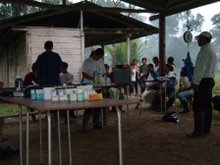Our trip started out in Nairobi, after a nice layover in London (during which time Orin, John, my mom and I visited Sushant's family's home in Kensington Gardens!). We arrived to Nairobi the night of the 20th and stayed at the AIM Guesthouse, which houses humanitarian workers for $30 a night. It's a nice place with a lived-in feel. The only complaint I have is that the culture is distinctly missionary, and I am distinctly (vehemently) not. More on that later...this post is about our trip, not my soapbox!
We spent the next day in Nairobi (Friday) getting tickets to Sudan, which cost an arm and a leg ($550 roundtrip each). We also picked up more medicines to distribute in Malek, our proposed clinic site.
The next day, we finally arrived in Juba. Our flight was delayed four hours, and we were greeted by Dr. Benjamin Malek, known to us as the only doctor in Bor Town, the capital of Jonglei State, where the vast majority of our sponsored SS students are from. (Malek, and apparently all Dinka names, are words for cattle. Malek means brown and yellow spotted bull). We were also greeted by Kwai, who we worked with extensively last year, and who was instrumental in helping us implement the sponsorship program. It was good to see them again. We were also reunited with Mach, a strong-willed student who we interviewed last year but could not support. Mach ended up being extremely helpful to us throughout the trip, at every leg of our journey, whether it was car problems, police trouble, or the endless Jonglei cow herds blocking the roads. His left hand was burned at 6
months by a bomb during the war; he was rescued by his father and operated upon to salvage his thumb. Mach is one of the most determined people I've met, and he gets things done.
Once in Juba, we settled into our new accomodations at Samaritan's Purse, another hostel for missionaries. We spent a few days meeting with key contacts in the city who gave us invaluable information. My favorite meeting was with Michael Lear, who is launching a nationwide health care capacity-building project in partnership with the UN. I and the whole team envision a great fit between our interest in training nurses and doctors, and his desire to expand health care services. I quickly realized that Juba is a city whose presence is dominated by aid workers, whether they are NGOs or UN workers. SS relies heavily on this shaky support to get anything done.
We also visited Juba Teaching Hospital, which serves the estimated population of 300,000 with shockingly few resources. It has a program that trains nurses in basic care, but my mom and I flipped through their exams, and the curriculum is not at all up to par. Some of their textbooks date back to 1937! We were shown around by Magda, a fierce and stylish aid worker who clearly has a vision for the hospital and the people it serves.
As the clinic we are envisioning would most likely resemble what in SS would be called a PHCC (primary health care clinic), we went to visit one in a place called Kator to see what it looks like. The building itself was impressive; the structure was donated by an Italian NGO. However, what the place lacked was human resources; there were only two personnel there, and the rest of the place was totally empty. It was, of course, a Sunday. But in the capital city of SS, in a country where malaria is endemic and maternal and child mortality is the highest in the world, Sunday is no excuse for an empty clinic. The doctor who was there told us he sees about 1000 cases of malaria a month, and receives only 60 treatments from the government. They expect those 60 treatments to last three months. It's a joke.
Malaria nets are also a tricky business. In the cities, it is easier to implement net use. But in the villages, many people live in cattle camps. The tribal way of life is wholly centered around cattle. It is their wealth, their religion, their ideology. They sleep near their cattle in tents of their own making, and are suspicious of people who advise them to drape strange netting over their shelter. It's not impossible to implement change, but often here in SS it seems pretty
close.
Subscribe to:
Post Comments (Atom)





No comments:
Post a Comment